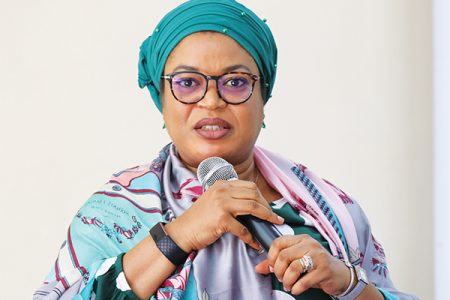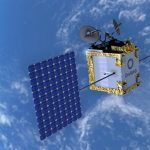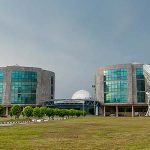Dr. Abimbola Alale, MD and CEO of Nigcomsat, talks to Vijaya Cherian about Nigerias space ambitions and how she is helping to drive that vision.
 Where does Nigeria stand in terms of satellite, satcoms, broadband and space?
Where does Nigeria stand in terms of satellite, satcoms, broadband and space?
Nigeria, as a country, is not doing so bad in terms of satellite-related activities and I believe we keep improving as a country. As of July 2020, our broadband penetration index stands at 40.14%. This shows a good rise from 39.58% in May this year. For the residents of rural areas, the role of satellite communication is evident in bridging the digital divide as the government continues to roll out more intervention initiatives such as knowledge-access centres, rural broadband initiatives, school access projects and so on. So, I will say that Nigeria is on the right path to improving its national broadband penetration index with a mix of hybrid communication technologies.
Could you tell us more about yourself and your evolution as a space professional?
I have a PhD in Security & Strategic Studies from Nasarawa State University, Keffi-Nigeria, and hold a Masters degree in Space Studies (MSc) and an MBA degree from the International Space University (ISU), Strasbourg-France. My education at ISU, France adequately prepared me for a career in the space sector. Soon after my Masters at ISU, I joined the National Space Research and Development Agency (NASRDA), where I started as Principal Scientific Officer in 2001; and worked on space education seminars and linkages with relevant institutions amongst other roles. In 2004, I was selected as Assistant Project Manager for the Nigcomsat-1 project. At the establishment of Nigcomsat Limited in 2006, I became the pioneer Marketing Director for the company, a position I held for eight years until 2014 when I was appointed as Managing Director.
How has Nigcomsat developed as a satellite operator since its inception in 2006 and can you elaborate on some of its milestones?
Nigcomsat is the first communication satellite operator in Sub-Saharan Africa, so taking that lead has not been an easy task. During the procurement process for the Nigcomsat-1 satellite, a know-how-technology-transfer programme was embedded. The training has enabled Nigerian engineers to handle satellite in-orbit operations and payload management without any hiccups.
Presently, I can tell you that the company has grown to the extent of carrying out in-orbit tests, spectrum management and hosting of services for other satellite operators and ISPs. In addition to the provision of core satellite services, we also provide tailor-made digital/communication solutions to government and private clients.

Is the GEO satellite you have right now sufficient to cater to Nigerias satellite needs? Do you have plans for more satellite launches?
Nigcomsat-1R is the only active GEO satellite we have in orbit. In terms of Nigerias capacity needs, we are able to meet it presently. However, as we are moving into a full digital economy, the company is planning to put another bird in space.
You sit in the hot seat. What do you perceive as some of the big challenges within Nigeria as well as Africa in terms of satellite connectivity and addressing those needs?
One of the major challenges with satellite connectivity in Nigeria is the issue of the high cost of customer premises equipment (CPEs) and satellite modems especially for young individuals in rural areas who wish to start small-to-medium enterprises (SMEs) and have need to ride on satellite connectivity. Things could be better if we do have some of these CPEs and modems manufactured in Nigeria. The original equipment manufacturers (OEMs) need to consider bringing the manufacturing ecosystem to Nigeria in order to serve Africa. After all, Africa is considered a very big market for the sector.
Another challenge is the issue of funding for space programmes. While funding can be sourced through Public Private Partnership (PPP) and from space investors, the satellite business is capital-intensive globally. Local investors are yet to understand fully how investment in this sector works especially because of the high-risk nature of the space segment.
Is Nigcomsat capable of fulfilling Nigerias specific satcom needs solo? If not, are partnerships the way forward?
While Nigcomsat is capable of providing all sorts of satellite communication needs for Nigeria and about 54 countries in Africa, we still have other foreign operators providing services within our space. Nigcomsat encourages and wants partnership with satellite original equipment manufacturers to ease the deployment of satellite connectivity across Nigeria and Africa.
Does Africa have an indigenous industry to support the development of its space initiatives?
I think this is what we eventually want for Africa – an indigenous satellite industry such as it exists in India and China for the Asian continent. However, ours is still in the incubation stage as active space activities commenced in Africa only in the late 1990s; therefore, we cannot compare ourselves with other continents that started this business in the 1960s and 1970s.
What is your opinion about LEO, MEO, GEO and which still works best for Africa?

These are orbits that complement each other in terms of payload functions/service delivery of a satellite. However, the best option to serve the remote parts in Africa is still GEO because of the wider footprint and in-orbit station keeping. However, to put a satellite in GEO is more expensive but it is safer in GEO with less debris as compared with other orbits.
Any upcoming satellite launches, and new initiatives planned for the coming years?
I think we are doing well as some of our plans related to this will be released in the second quarter of 2021.
What percentage of Nigcomsats workforce are women and how are women contributing to this sector?
The space industry is gender-free and in Nigeria, we believe in 35-40% women participation in all sectors within the country. In Nigcomsat, we have maintained that policy of 35-40% participation from women as a lay-down policy of the federal government.
Women are doing well in the space industry as far as Nigeria is concerned. The Women in Aerospace, Nigeria chapter runs a lot of annual competitions that focus on various space-related activities. We organise career days and pep talks in order to encourage and develop the interests of young girls in pursuing space-related careers. About four female Nigerian engineers were among those that were trained in space operations and control between 2006 and 2007; they have, in turn, trained several others. Other than female engineers, we have trained other female professionals in strategy, space law and policy.
What is your vision as a space professional and what you think should be Africas satellite and space dream?
My vision is to see the growth of space activities in Africa become more promising for local investors to put their money in it. I think this is achievable with proper planning, more seminars on satellite financing hosted in Africa and good policy in place to encourage prospective investors. With these, I think in about a decade, space activities/programmes in Africa will be more competitive.
What is Nigcomsats vision and your vision for Nigcomsat?
Nigcomsats vision is to be the leading satellite communication solutions provider in Nigeria and Africa. My vision is to add more satellites into orbit for Nigcomsat and position the company to achieve its set vision.
















































































